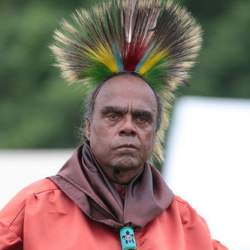
The Nanticoke Lenni-Lenape Tribe Has Tribal Laws against Its 3,000 Members Gambling, Much Less Owning Casinos
The Nanticoke Lenni-Lenape tribe of has sued the state of New Jersey for due process and equal protection violations. The tribe says the suit was filed because it says the state is trying to repeal its status, on the presumption the tribe is trying to set up a casino. The Native American tribe has one of three recognized tribal reservations in New Jersey.
The Nanticoke Lenni-Lenape is a 3000-member tribe known as the “Delawares”. The tribe was recognized as late as 2010 by New Jersey in a report to the U.S. Census Bureau.
Lenni-Lenape Do Not Want Casino
According to the lawsuit, the tribe avoids gambling altogether and has never tried to assert its right to own brick-and-mortar casinos. Presumably, the tribe would be able to assert those rights via a lawsuit with the State of New Jersey or the federal government, but the Nanticoke Lenni-Lenape take a moral stand against gambling–even passing a tribal law against tribe members partaking in the hobby.
One might think such laws and public statements would assuage any fears by New Jersey’s leaders about a tribal casino being built to compete against the already-struggling Atlantic City private casinos. The Nanticoke tribe has a splinter faction called the Unalachigo Band of the Nanticoke Lenni-Lenape Nation, though, and the splinter group approves of gambling.
Splinter Faction Sued for Casino
In fact, in 2007, the Unalachigo Band of the Nanticoke Lenni-Lenape Nation sued the state of New Jersey to get the right to build its own casino in central New Jersey, but lost the legal battle. Meanwhile, the state’s two other recognized Native American tribes–the Powhatan Renape Nation and the Ramapough Mountain Indians–have not expressed an interest in building casinos.
Latest Lawsuit Claims Discrimination
The recent lawsuit by the Nanticoke Lenni-Lenape tribe stated in its legal filing that the state of New Jersey had “wrongfully and erroneously assumed that the [Lenni-Lenape] Nation’s desire for continued state recognition is motivated by the intention to conduct casino gaming.”
The suit, which was brought by Frank Corrado of Barry, Corrado & Grassi in Wildwood, New Jersey, states that New Jersey is being discriminatory in its attempts to repeal the Nanticoke’s official status. The filing also mentions that federal recognition is needed to build such a casino, so its attempts to repeal the tribe’s status make no legal sense.
The Nanticoke Lenni-Lenape’s complaint says, “While taking the position that it does not recognize the three New Jersey tribes, [the] defendant has yet to articulate what exactly the tribes are, except to imply that they are something lesser and undefined.”
Supposed Casino Greed Is a Stereotype
In describing the case for discrimination, the tribe’s lawsuit says that the state is taking decisions based on the stereotype that Indian tribes always must own casinos–which simply is not the case. The suit continues, “[The] Defendant’s purported justifications for its position are pre-textual. On information and belief, the state is actually motivated by a racial-stereotype-driven and irrational fear that any American Indian tribe, if recognized as such, will seek to conduct gaming in competition with New Jersey’s politically powerful non-Indian gaming interests.”
NJ Never Recognized Tribe, Says State Official
The State of New Jersey, on the other hand, claims it has never recognized the Nanticoke Lenni-Lenape tribe. Instead, the state has only “acknowledged” the tribe. No due process has been undertaken to recognize the 3 tribes. Instead, says New Jersey Acting Attorney General John Hoffman, only the federal government can recognize the tribe.
The tribal authorities would have reasons beyond casino properties to want to retain (or gain) recognition. Tribes with state recognition have the right to apply for federal healthcare grants, access hundreds of thousands of dollars in student scholarships, and sell “Indian Made” arts and crafts. Recognized tribes also can get special considerations when applying for state contracts.
Discussions with Chris Christie
In the lawsuit, the Nanticoke Lenni-Lenape tribe claims that their leaders were in discussions with Governor Chris Christie on a resolution for the two sides’ disagreement. The suit claims that the Bridgegate Scandal and Gov. Chris Christie’s long-awaited run for the Republican Party’s US presidential nomination derailed those talks, as Christie did not have time for such issues.
The Lenni-Lenape tribe claims to have lived in the New Jersey area for up to 12,000 years. The tribe, like so many Native American tribes, have dealt with betrayal and broken promises in its recent history. In 1758, the tribe was granted a reservation in Burlington County by the British colonial authorities. In the early days of the United States, New Jersey officials tried to remove the Lenni-Lenape tribe to places further west (mainly Kansas and Oklahoma), as well as Canada. In the 21st century, most of the remaining members of the tribe dwell in New Jersey again.
